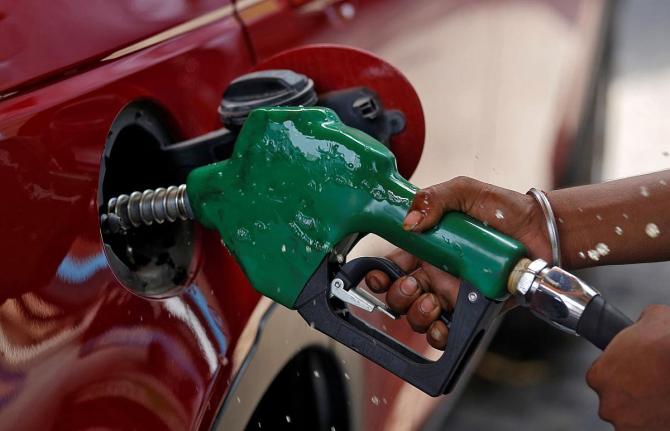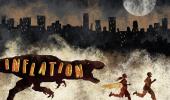However, it may still not change its stance on the policy rate as inflationary pressures are coming from high commodity prices.

The consumer price index (CPI)-based inflation rate may not fall below the Reserve Bank of India’s mandate of six per cent till April due to elevated oil and commodity prices.
This may prompt RBI’s monetary policy committee to raise its projections for inflation next month. However, it may still not change its stance on the policy rate as inflationary pressures are coming from high commodity prices.
Oil marketing companies have raised petrol and diesel prices by 80 paise a litre for the third day on Friday. They had raised the prices on Tuesday and Wednesday also.
OMCs have raised petrol prices in the range of Rs 2.27-2.53 a litre in the four metros -- Delhi, Mumbai, Chennai and Kolkata, while diesel prices have increased in the range of 2.28-2.56 per litre in three days.
However, for calculating inflation rate, year-on-year (YoY) variation of prices are factored in.
Petrol prices were up by as low as almost eight per cent in Delhi (YoY) and as high as 18 per cent in Kolkata as on Friday. Similarly, diesel prices were higher by about nine per cent in Chennai and about 10 per cent in Delhi and Kolkata.
In the index-based inflation rate, weight of items are important to calculate the rate of price change.
Petrol has 2.19 per cent weight in CPI while diesel has 0.15 per cent in the index.
ICRA chief economist Aditi Nayar said there will be staggered increases in petrol and diesel prices until the losses of OMCs are recovered.
“Roughly Rs 15 will be needed to recoup the losses. The entire amount will be recovered by April. Our estimate is that CPI inflation rate would be 6.2 per cent in March and 6.4 per cent in April,” she said.
Nayar projected CPI inflation rate to be 5.6-5.8 per cent in May and June.
If this happens, MPC’s projection of inflation rate for the current fiscal year and the next fiscal year may have to be revised.
MPC --in its February policy review -- has projected inflation rate at 5.3 per cent for the current fiscal year, with the figure in Q4 at 5.7 per cent.
On the assumption of a normal monsoon in 2022, it pegged the inflation rate at 4.5 per cent for 2022-23 with Q1’s figure estimated at 4.9 per cent.
If Nayar’s projections turn correct, the inflation rate will be 5.78 per cent in 201-22 with the figure in Q4 at 6.09 per cent. It would also be 5.9-6 per cent in the first quarter of the next fiscal year.
Nayar expected the MPC to increase its inflation forecast for Q1.
However, she does not expect it to change its policy stance immediately in April since the increase in inflation rate is due to global commodity prices.
Bank of Baroda chief economist Madan Sabnavis said when crude price goes up by $1 a barrel, the cost of the refined product goes up by approximately 55-60 paise per litre.
He said around Rs 16.5 a litre increase is needed for OMCs to recoup their losses.
“This will be around 15 per cent increase over the static rate,” he said. This will have an impact on CPI, which will manifest more from April onwards and only partly in March.
“Direct impact would be around 0.4-0.45 per cent and the indirect one, which will come through the input and freight routes, will push up inflation by 0.6-0.7 per cent,” he said.
Alternatively, the government can reduce excise duty, which will hit the exchequer.
Sabnavis said, on a monthly basis, “We consume close to Rs 1,000 crore of petrol and diesel (ratio is 70 per cent diesel and 30 per cent petrol). This means that every rupee reduction (in excise duty) will affect revenue by Rs 1,000 crore a month,” he said.
Nayar said if average global crude prices stand at $100 a barrel and there is no cut in excise duty, CPI inflation would be 6.1 per cent in Q1 of the next fiscal year.
But if there is excise duty cut to pre-pandemic levels, inflation rate would be 5.9 per cent in this period.
However, if crude prices rise to $115 a barrel, inflation rate would be 6.3 per cent without excise duty cut and 6.1 per cent with excise duty cut during this period, she said.
Global crude prices are fluctuating widely these days. Prices were $117.71 a barrel on Thursday against $103.5 on March 17 and $93.12 on March 1.











